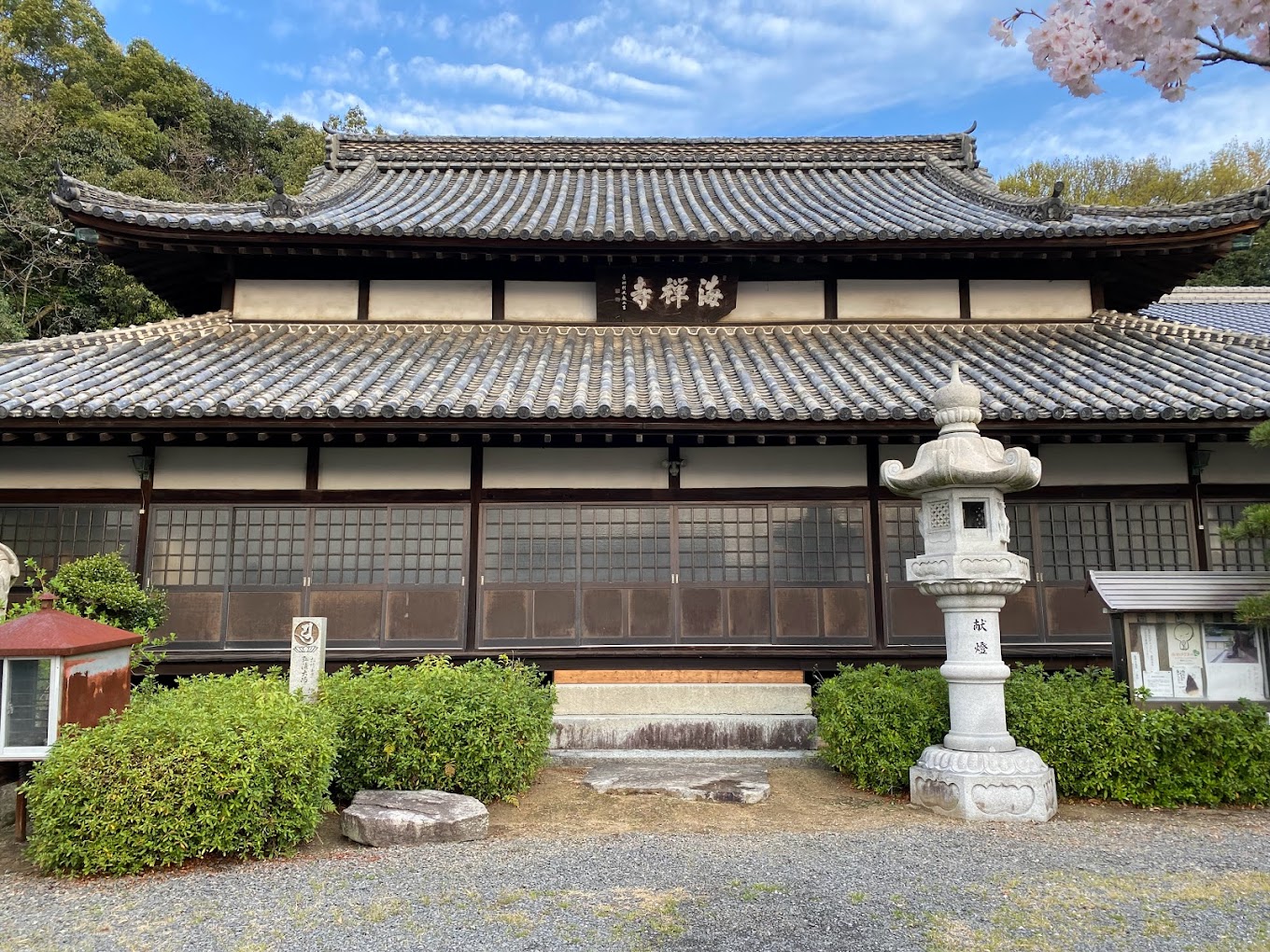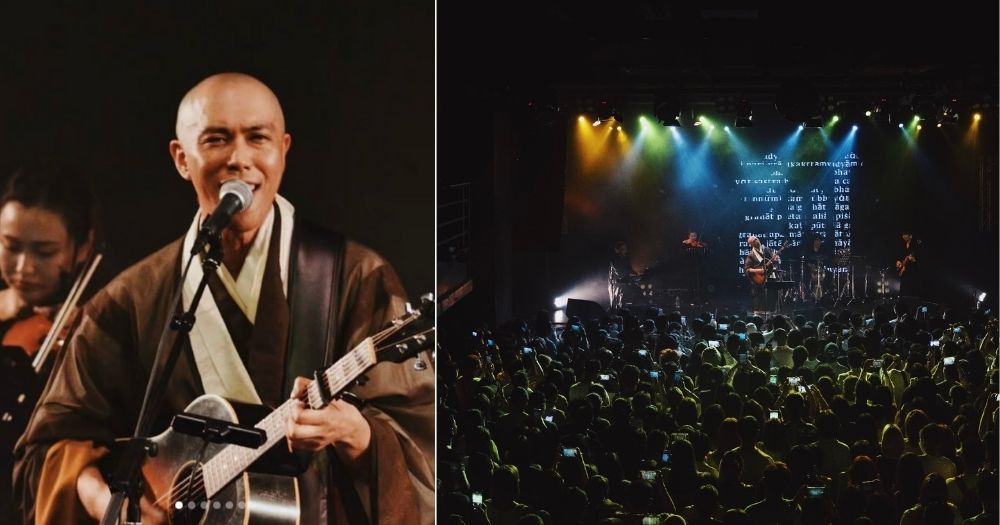When it comes to Buddhist chanting, very few may think of listening to it at a concert played by a Japanese monk with a guitar.
However, people in Singapore will get to experience one such performance tomorrow evening (Oct. 17) at Capitol Theatre by Japanese monk and musician, Kanho Yakushiji (薬師寺寛邦).
Yakushiji's upcoming show is part of his "Blessing" World Tour.
He is currently the 16th vice abbot of Kaizen Temple, a Zen Buddhist temple located in the southwestern Japanese city of Imabari on Shikoku island.
 Image via Google Maps
Image via Google Maps
Attempted to escape fate & Buddhism
However, Yakushiji's relationship with Zen Buddhism had not always been a smooth one.
Speaking to Mothership, he shared that he was destined at birth to take over Kaizen Temple and become its abbot as he was the only son.
Refusing to accept this fate, Yakushiji decided to resort to music, which he had fallen in love with as a teenager, as an "escape route".
In 2003, the then-24-year-old formed a chorus group called "Kissaquo (キッサコ)," which means "Go have some tea" in Japanese, with his schoolmates from the music school he was attending at the time.
The band name is also a Zen Buddhism phrase, which is typically used by Zen masters to encourage their disciples to find wisdom and enlightenment in simple activities in life, such as when having tea, according to Engaku Temple, a Zen Buddhist temple in Kamakura, Japan.
Kissaquo gave its first live performance at Kennin temple in Kyoto after meeting its head priest, who asked the band if they would like to perform at an event at the temple.
Encounters that led Yakushiji back to Buddhism
While Yakushiji embarked on his music career to escape Buddhism, it appeared that his connection to the religion could not be severed entirely.
He recalled that after a live performance at one shopping mall, a visitor approached him and said, "Listening to your music reminded me of my grandfather who raised me."
These words made Yakushiji realise that there was one commonality between the songs he sang and the memorial service his father would perform for the deceased — to help others remember (思い出す).
"For the bereaved family, they remember the deceased and cherish their memories of that person through memorial service. That was exactly what the visitor felt when hearing my song," he explained.
Setback in music career
Besides the encounter with the visitor, which kindled Yakushiji's interest in Zen Buddhism, another turning point which led him back to the religion was a setback in his music career.
In preparation for his CD debut, Yakushiji suddenly found himself sliding into a slump and could no longer write any songs.
At that moment, he realised that music had been an escape route for him all along.
He even started resenting music, thinking that he would never be able to sing again.
However, this antagonism faded away after Yakushiji picked up books on Zen Buddhism during a visit to a bookstore.
"I learned the importance of facing my inner self and confronting the deep darkness inside my heart. This gave me the opportunity to think about what I really wanted to do again," he said.
Following the soul-searching, Yakushiji decided that he wanted to return to Zen Buddhism and went to a temple in Kyoto for training at the age of 30.
Upon completing his training in 2013, he became the vice abbot of Kaizen Temple.
Combining modern music with Buddhism
Yakushiji's time in Kyoto was also what led him to combine pop music with Buddhist chanting.
As part of his training, he read sutras, including the "Heart Sutra," with about 20 monks.
He was moved by their overlapping voices, and wondered what would happen if he harmonised his own chanting and made a recording.
Here, Yakushiji believes that his experience at Kissaquo also helped him with this new endeavour.
"I feel that somewhere along the path which I have taken up till this point, there is always a hint of something big that triggers and inspires me," he added.
To date, Yakushiji has released six albums and over 15 singles, according to his official website.
'No inherent conflict' between modern music & Buddhism
While Yakushiji does not believe there is any inherent conflict between modern music and Buddhism, he admitted candidly that he was concerned at first when he made "Heart Sutra cho ver."
This is because he worried that the music would change the image of Buddhist chanting drastically.
However, as Yakushiji continued producing more music, he gradually came to terms with the new form, especially as he created the music while upholding respect for each and every sutra.
"I have come to think that it is alright to be free in terms of form because the 'Heart Sutra' teaches to have an unbiased mind," he explained.
Nevertheless, this new form also triggered individuals to criticise Yakushiji's music, including by labelling it as "disrespectful."
However, these criticisms do not bother the musician-monk as he believes that his listeners should be free to express their own opinions.
"I am happy that I have touched their hearts. I would like to continue making music that moves hearts in the future," said Yakushiji.
Not Yakushiji's first time performing in Singapore
While this is Yakushiji's first world tour since the Covid-19 pandemic, his upcoming concert is not his first time performing in Singapore.
In July 2022, he held a collaborative live concert titled "Sound of Peace" with Malaysian dharma musician Imee Ooi at Esplanade Concert Hall.
However, this time around, Yakushiji said he would like his Singapore audiences to enjoy his music as a one-man live show.
Message to Singapore audiences
When asked what message he would like to convey to his Singapore audiences through his concert, Yakushiji said he was particularly concerned that many no longer have "the time to do nothing."
In fact, he believed this lack of time to do nothing is the "root" of the problem humanity faces in this age of information overload when everyone is constantly on their phones and searching for an answer to quell their insecurities.
Yakushiji, therefore, hopes to encourage his listeners to take the time to look inward, rather than outward, for such an answer:
"'Reset your mind and face yourself,' this is the message I endeavour to convey through my music as a monk and musician."
You can listen to Yakushiji's music here or get tickets to watch him live at Capitol Theatre here.
Top image via Kanho Yakushiji/Facebook and MUGEN Creations

If you like what you read, follow us on Facebook, Instagram, Twitter and Telegram to get the latest updates.



